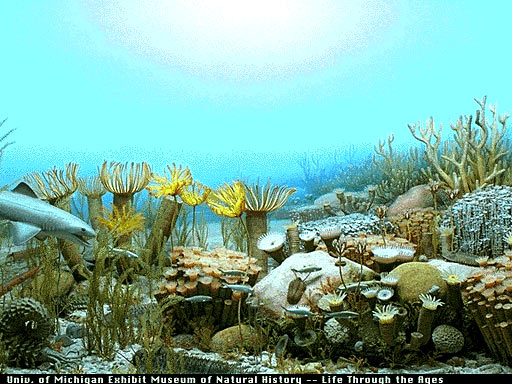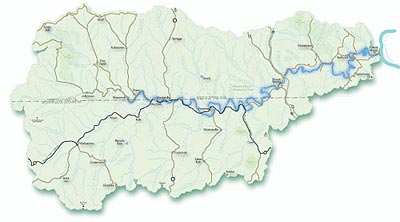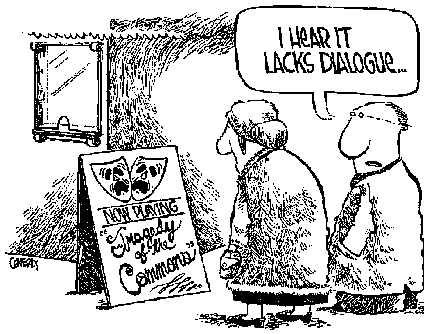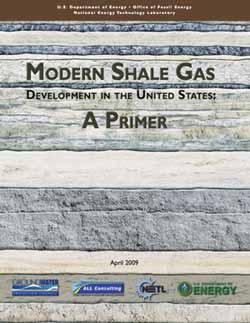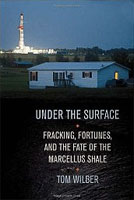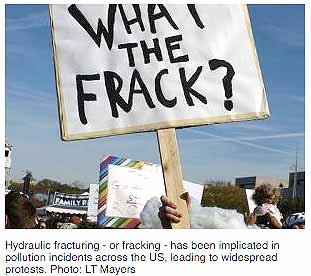Background
Gas Drilling Background and History
Powder River region of northern Wyoming.
See: SkyTruth: Upper Green River Valley - A View From Above
Every day millions of gallons of clean ground water in the American West are being contaminated, all in the rush to drill for gas.
BILL WEST: It took thousands of years to recharge these aquifers.
They're pumping it out and in maybe ten years it will be gone...
This is an excellent background on the Marcellus Shale Gas Rush. Website is sponsored by Shell which may signify a pro-industry editorialization. Nevertheless, the photographs and production are impressive. Shell's message here:
"Let's Build a Better Energy Future. Let's Go. See how we're helping to secure energy for the next generation."
See: Ed Pilkington. "Shell pays out $15.5m over Saro-Wiwa killing." The Guardian. June 9, 2009.
See: Jad Mouawad. "Shell to Pay $15.5 Million to Settle Nigerian Case." NYT. June 8, 2009.
Forcing Gas Out of Rock With Water
The populous mid-Atlantic market pays a relatively higher price than the South for energy, at the same time that exploration and finding costs are dramatically lower in the Marcellus than in the Barnett and the other shales around the United States.
“It’s very repeatable,” says Range spokesman Matt Pitzarella. “Every well in Washington County is either good or great.”
See: Candice O'Grady. "Newsweek Greenwashes the Oil Lobby for Real." Feb. 2010.
Nolan Hart. (2008). Includes photos, maps, illustrations.
Named for the town of Marcellus New York, where the shale reaches the surface, it is a Devonian age (roughly 390 million years old) member of a geological structure known as the Hamilton group. It formed when Devonian age seas...covered much of North America.
Government officials from around the world have recently declared that the risks of natural gas drilling are too great to allow it to proceed without additional analysis:
- The Town Council of Bartonville, Texas, in the Barnett Shale, voted to impose a 90-day moratorium on new permits for natural gas drilling and hydraulic fracturing in order to give the Council time to review the Town's regulations. They are particularly concerned about chemicals used in hydraulic fracturing.
- The Prime Minister of France ordered a national ban on shale oil and gas drilling until two separate government reports are published in June and there is more information available on the risks.
- The government of Quebec halted all shale gas drilling after an expert committee found that scientific data regarding the impacts of shale gas development are partial or non-existent. Quebec will be conducting its own in-depth analysis.
- The Maryland House of Delegates passed legislation that essentially halts any natiural gas drilling in the state until a two-year study on the risks is completed.
- Regarding the risks, In the second draft of a Health Impact Assessment of natural gas operations in western Colorado, public health experts concluded that: "Battlement Mesa residents will most likely be affected by chemical exposures, accidents/emergencies resulting from industry operations, and stress-related community changes." The experts provide more than 70 specific recommendations to address the potential impacts.
- And just yesterday, the City Council of Morgantown, West Virginia, passed a resolution demanding that acting Governor Tomblin convene a special legislative session to toughen regulations on natural gas drilling in the Marcellus shale field.
See: Criticism: Tragedy of the commons | Wikipedia
More significantly, criticism has been fueled by the "application" of Hardin's ideas to current policy issues. In particular, some authorities have read Hardin's work as specifically advocating the privatization of commonly owned resources.
Consequently, resources that have traditionally been managed communally by local organizations have been enclosed or privatized. Ostensibly, this serves to "protect" such resources, but it ignores the pre-existing management, often appropriating resources and alienating indigenous (and frequently poor) populations. In effect, private or state use may result in worse outcomes than the previous management of commons.
Ostrom, E., J. Burger, C. B Field, R. B Norgaard, and D. Policansky. 1999. Revisiting the commons: local lessons, global challenges. Science 284, no. 5412: 278.
Victor L. Ponce. Hardin's "Tragedy of the Commons" Revisited or We Are All In the Same Boat.
Another example of a typical commons is groundwater. Nobody really owns the groundwater; it is technically up for grabs. However, individual pumping of too much groundwater can result in the depletion of the resource, to say nothing of other related effects or losses, such as land subsidence and salt-water intrusion...Eventually, depletion by a few means depletion for all.
See: USGS. Land Subsidence
Victor Ponce is a Professor of Civil, Construction and Environmental Engineering at San Diego State University.
See: Marcellus-Shale.us. December 2, 2009. "Dunkard Creek Fish Kill."
The Tragedy of the Commons
Adding together the component partial utilities, the rational herdsman concludes that the only sensible course for him to pursue is to add another animal to his herd. And another... But this is the conclusion reached by each and every rational herdsman sharing a commons.
Therein is the tragedy. Each man is locked into a system that compels him to increase his herd without limit -- in a world that is limited. Ruin is the destination toward which all men rush, each pursuing his own best interest in a society that believes in the freedom of the commons. Freedom in a commons brings ruin to all.
I would like to focus your attention not on the subject of the article (national security in a nuclear world) but on the kind of conclusion they reached, namely that there is no technical solution to the problem.
An implicit and almost universal assumption of discussions published in professional and semipopular scientific journals is that the problem under discussion has a technical solution. A technical solution may be defined as one that requires a change only in the techniques of the natural sciences, demanding little or nothing in the way of change in human values or ideas of morality...
...It is our considered professional judgment that this dilemma has no technical solution.
See: J. B. Wiesner and H. F. York. "National Security and the Nuclear-Test Ban." Sci. Amer. 211 (No. 4), 27 (1964).
See: The Tragedy of the Commons. Food and Agriculture Organization of the United Nations (FAO) in:
Jean-Marie Baland and Jean-Phillipe Plateau. (1996). "Halting degradation of natural resources". Food and Agriculture Organization of the United Nations. Rome, Italy.
Is there a Role for Rural Communities?
The present work is concerned with the topical issue of natural resource management. It does not deal, however, with broad-spectrum environmental concerns such as protection of wilderness areas (for example, the south pole), air or water pollution, etc., but focuses on local ecosystems. What distinguishes local-level resources from larger ecosystems is that:
(1) they are susceptible of appropriation by relatively small units (including individuals) and
(2) they can lead to rivalry in consumption in so far as yields of these resources are clearly perceived as subtractable. This book thus addresses the question as to how these local or village-level natural resources (as contrasted with global commons) can be most efficiently and equitably managed. In other words, can we find guidelines or sound theoretical principles for an optimal long-term exploitation of local resources (forests, irrigation water, pastures, lakes and rivers, sea areas, etc.)?
Disturbing evidence highlighting rapid processes of resource depletion, particularly so in developing countries, has stimulated a lot of theoretical and empirical works during the last decades. Moreover, relevant theoretical tools (such as game theory) have been developed independently of environmental concerns which have potential applications to this field.
The Primer provides regulators, policy makers, and the public with an objective source of information on the technology advances and challenges that accompany deep shale gas development and describes the importance of shale gas in meeting the future energy needs of the United States.
Protecting and conserving water resources is an important aspect of producing shale gas, and this effort was championed by the Ground Water Protection Council through a cooperative agreement with NETL.
U.S. Department of Energy (DOE), Office of Fossil Energy and National Energy Technology Laboratory. Modern Shale Gas Development in the United States: A Primer. Washington, D.C. U.S. Department of Energy (DOE). April 2009. 116pages. [PDF-5.11MB].
U.S. Energy Information Administration (EIA) Energy Kids Website. Nonrenewable Natural Gas.
The main ingredient in natural gas is methane, a gas (or compound) composed of one carbon atom and four hydrogen atoms. Millions of years ago, the remains of plants and animals (diatoms) decayed and built up in thick layers. This decayed matter from plants and animals is called organic material — it was once alive. Over time, the sand and silt changed to rock, covered the organic material, and trapped it beneath the rock. Pressure and heat changed some of this organic material into coal, some into oil (petroleum), and some into natural gas — tiny bubbles of odorless gas.
Burning natural gas produces carbon dioxide which is a greenhouse gas. Greenhouse gases contribute to the "greenhouse effect."
Scientists know with virtual certainty that increasing greenhouse gas concentrations tend to warm the planet, according to the U.S. Environmental Protection Agency, Climate Change State of Knowledge.
As with other fuels, natural gas also affects the environment when it is produced, stored, and transported. Because natural gas is made up mostly of methane (another greenhouse gas), small amounts of methane can sometimes leak into the atmosphere from wells, storage tanks, and pipelines.
Question and Answer period starts at 52:00. See: Potential Gas Committee reports unprecedented increase in magnitude of U.S. natural gas resource base.
(January 20, 2010) John Curtis, Professor of Geochemistry and Director of the Potential Gas Agency at the Colorado School of Mines, discusses a broad range of perspectives on the state of U.S. shale gas reserves and resources along with the industries and technologies that are involved in extracting and bringing these energy resources to market.
Fast Food Energy: Mom and Dad’s Great American Gas Rush.
Neil Zusman
Wilber, Tom. Under the Surface: Fracking, Fortunes and the Fate of the Marcellus Shale. Ithaca: Cornell University Press, 2012. Print.
Hydrofracking’s proposed a massive industrial transformation on a huge swath of the rural Northeastern U.S. and has divided communities and sparked an intense public debate touching on our method of economics, law making and enforcement. The book under review, Under the Surface, is one of less than 100 books published on the subject of hydraulic fracturing or fracking. Author Tom Wilber covered the environmental beat for Binghamton, N.Y.’s Press & Sun Bulletin.
Even George W. Bush said in a Presidential speech, that "Americans are addicted to oil". In my opinion, we are also addicted to natural gas and it is being pushed by the industry and abetted by govenments. A Theory of Rational Addiction (1988) by economists Gary Becker and Kevin Murphy, argued that shooting heroin is a logical choice when all you're giving up is a crappy existence. 1
Time’s humorist, Joel Stein, wrote about “Instant Gratification”. 2 Has everything in our culture become humorous? The controversy over how fast to develop the natural gas that lies beneath the Northeastern U.S. has not had the privilege of humor that Stein brings to his observations on self-gratification, or his penchant to deliver it in his own narcissistic, Seinfeld-esque 'cult of personality' idiom. Nevertheless, the fatter we all get craving our Big Macs, carbonated corn syrup, and drugs; the richer a few of us will become. The longer we are told to believe that hydrofracking is, in Terry Engeldr's words, 'a Christmas present for America', the more we will accept it as inevitable.
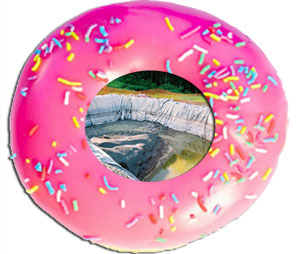 3
3
It took an insider at the cigarette industry to finally confirm what the Surgeon General was trying to tell us 30 years earlier. And yet, the labels and warnings and widespread anti-smoking campaigns will not keep me from my craving. I may need a cigarette today and I am sure that I can get it. I don’t have that app that shows me what I will look like when I’m 80. Stein’s app would change my picture of the 80 year old me posted electronically on my fridge each time I eat a jelly glazed doughnut. The app for the cigarette smoker – would likewise factor the algorithms of that gratification. And our energy craving…trouble is, the math guys don’t have the data for that one.
In fact, so much of this stuff has been covered up and fabricated, that it’s hard to get any real data at all. The University of Pennsylvania had to eat crow over “The Penn State Report”. 4
“Graham Spanier, president of the university received a letter from an advocacy group complaining that the so-called Penn State report confused academic research with propaganda by its industry sponsors.”
…Spanier ordered William Easterling, dean of the college that published the report, to address the complaint. A few weeks later, Saxton (president of the Board of Responsible Drilling Alliance) received a reply from Easterling conceding that an internal review “found flaws in the way the report was written and presented to the public.” The fact that the report failed to identify its sponsor was a “clear error”. 5(p98)
 6
6
None of this stuff is illegal though. It’s a free market. As if that were everything.
Investors are satisfied with the way a cigarette or sugar doughnut or Big Mac works on our brain. Is that funny? Tom Wilber asks if will it be boom or bust and cites the work of Janette Barth.5(p101) Susan Christopherson and Ned Rightor, in "How Should We Think About the Economic Consequences of Shale Gas Drilling?" 7 have also wondered about that in a Park Foundation funded study. Who to believe?
Will our children grow up to be gas engineers or scholars, musicians or maids in the halls of the energy elite? We want them to be prepared. Will they be able to compete in the free market? And what about nature? What is a life worth? The EPA has put a valuation on it. 8 It’s worth about 7.9 million dollars. Is that chump change?
Humor is a challenge that may not be begged of Mr. Wilber’s reporting. He never intended his book to be funny. He gets both ends of the story on flowback, which are recovered fracturing fluids. According to the EPA’s web page, “Hydraulic Fracturing Background Information”, 9 disposal options for flowback include discharge into surface water or underground injection. Treatment is typically performed by wastewater treatment facilities. How companies deal with the disposal of the millions of gallons per well of waste-water produced in the gas extraction process is apparently well-known and regulated, but Wilber reveals that
“…There was something else that bothers Ken [Ely]. He hadn’t anticipated the wells on his land would produce so much waste. This included not only the spent chemical solution used to stimulate each well, but tens of millions of gallons of brine and whatever else came up from the holes. The flowback was supposed to be treated and disposed of at plants equipped to handle it, yet nobody could tell Ken exactly where those plants were.
…When I [Wilber] asked regulators where the flowback was being treated, they told me it was a question for the companies. When I asked company representatives, they told me, “It’s all regulated.” 5(p86)
Now that’s funny.
He interviewed Terry Engelder, who released the potential of the Marcellus Shale in the “Penn State Report”. He estimated there are 500 trillion cubic feet of natural gas waiting to be discovered. By Tony Ingraffea’s calculations, the Cornell engineering professor who has criticized the rush to develop the gas resource so quickly, it will take 400,000 wells to get to it, with each well requiring 5 million gallons of fresh water. That’s 2 trillion gallons of water going in, and somewhat less coming out that would need to be trucked, disposed of, or treated, or injected into the ground. Cayuga Lake, which is 40 miles long, 2 miles wide, and has a maximum depth of 435 feet, contains a total of 2.5 trillion gallons of water. 10
Wilber’s book reminds us how the facts of the water draw are not just about measuring the water usage and arguing those numbers, the huge impact that hundreds of thousands of truck trips on county roads will have on rural communities will be catastrophic, notwithstanding the composition of the wastewater itself.
The Marcellus Rush is all humorless self-indulgence, fancy landmen with Texan drawls and cowboy hats who look like your grandfather; engineers and scholars who think they’ve discovered the next big thing; and then the one after the big thing that will save us from the next big thing. Wilber gives us the Terry Engelder character, larger than life:
“He thought of the Marcellus discovery as a Christmas present for America; and on his drive home, after days of thinking about the possibilities, he was given to playing the Radetzky March by Johann Strauss…” 5(p96)
Somewhere in Washington, EPA Director Lisa Jackson’s speechwriter, tunes her Cello, and begins to play Bach’s Solos for Cello. Have you listened to those speeches? 11
If my life is so crappy that I don’t care if I smoke a pack a day or shoot heroin, whose job is it to stop me? I can buy any brand I want. Some brands even offer healthy alternatives. If I live in a poor neighborhood and can’t get a supermarket nearby, the government might have a program to encourage a market to open so I won’t have to live on Wendy’s or Big Macs. We like this stuff, we eat it to obesity and vote for it with our dollars; but the U.S. government tells me that I need a better diet, more choices. When it comes to energy, I can use natural gas, or… natural gas. I can put gasoline in my tank, or gasoline… People are buying electric cars. Maybe the trend is shifting.
“I asked Hanger where natural gas fit into his vision of green energy. It was better than coal, he said, the mining of which destroys mountaintops and the burning of which produces CO2 gases and mercury that accumulate in the food chain. In his view, a surge in the development and demand for alternatives, including solar panels, is imminent, due mostly to China’s burgeoning interest in the industry. “The baby has been born,” he said. "China is intent on building solar panels for the world. Those changes will come and those changes will be rapid – less than five years." 5(p204)
The cult of personality, as portrayed so eloquently in this important book, may be in need of a sense of humor and the self-deprecating sarcastic one-liner to make them marketable, but they have brought out our need to think about energy, the best thing our planet of humankind needs.
At one end of the spectrum were characters who
“…embraced the industry as an expression of old-fashioned free enterprise…At the other end of the spectrum were those who saw the industry as a relic of grandfather clauses and cronyism that dated to a period of predatory exploitation, when fantastical deals were pitched by door-to-door peddlers, manufacturing waste was buried in lagoons on private property, and unions were nonexistent. The middle ground was occupied by an untold number of consumers used to cheap plentiful energy, and property owners, who had their worries but also were able to calculate how much a mineral rights lease might be worth.” 5(p104)
Wilber draws the sides in as divisive and rude a public debate as one might expect to see on Fox TV. I don’t know why it hasn’t been picked up as a reality show yet, but it may be soon. Stu Gruskin, former asst. head of the NYS DEC admires civil discourse on his blog.12 He sounds like a sweet anachronism. I bet each side of this debate would like to call each other “big fat idiots” the way Al Franken tells it in his book on Rush Limbaugh13 or in Lies – and the Lying Liars who Tell Them, investigating the fabrications published by Bill O’Reilly, Ann Coulter, and Sean Hannity. One of Franken’s big ideas in Lies is that even good journalists contribute to the lie, taking at face value the reporting of their colleagues and re-iterating the report without investigation. 14 Wilber investigates.
References
1. Murphy KM, Becker GS. A Theory of Rational Addiction. Journal of Political Economy. 1988;96(4):675-700.
2. Stein J. "Instant Gratification." Time. 2012. Available at: http://www.time.com/time/magazine/article/0,9171,2113162,00.html [Accessed May 2, 2012].
3. Zusman N. Mashup of Hubbard 1, 6-H, 5-H, Springville, PA by Helen Slottje and Homer Simpson Doughnut. 2012. Available at: /frack_files/frac-pond-Helen-Slottie.jpg [Accessed April 28, 2012].
4. Glass I. This American Life Search Archive 440: Game Changer Transcript. Available at: http://www.thisamericanlife.org/radio-archives/episode/440/transcript [Accessed May 2, 2012].
5. Wilber T. Under the surface : fracking, fortunes and the fate of the Marcellus Shale. Ithaca: Cornell University Press; 2012.
6. Guariglia J. Cancer - Rogue Cells | Photo by Justin Guariglia. Available at: http://science.nationalgeographic.com/science/health-and-human-body/huma... [Accessed May 2, 2012].
7. Christopherson S, Rightor N. Working Paper Series: A Comprehensive Economic Impact Analysis of Natural Gas Extraction in the Marcellus Shale | How Should We Think About the Economic Consequences of Shale Gas Drilling? 2011. Available at: http://www.greenchoices.cornell.edu/downloads/development/marcellus/Marc....
8. Appelbaum B. "A Life’s Value May Depend on the Agency, but It’s Rising." The New York Times. 2011. Available at: http://www.nytimes.com/2011/02/17/business/economy/17regulation.html?_r=... [Accessed February 17, 2011].
9. U.S. Environmental Protection Agency (EPA): Office of Ground Water and Drinking Water OW. U.S. Environmental Protection Agency (EPA): Hydraulic Fracturing Study (2010-2012). Available at: http://water.epa.gov/type/groundwater/uic/class2/hydraulicfracturing/ind... [Accessed April 13, 2010].
10. Cayuga Lake Watershed Network. 2005. Available at: http://www.cayugalake.org/network/faq.php [Accessed May 2, 2012].
11. Jackson L. Lisa P. Jackson, EPA (lisapjackson) on Twitter. 2010. Available at: http://twitter.com/lisapjackson [Accessed January 11, 2011].
12. Gruskin S. Stuart Gruskin - Google+ - It's refreshing to read about public officials that are... Stuart Gruskin - Google+. 2011. Available at: https://plus.google.com/115541440669480452148/posts#11554144066948045214... [Accessed May 2, 2012].
13. Franken A. Rush Limbaugh is a big fat idiot and other observations. New York: Delacorte Press; 1996.
14. Franken A. Lies : and the lying liars who tell them : a fair and balanced look at the Right. New York: Dutton; 2003.
See also: Wilber, Tom. “Shale Gas Review.” Shale Gas Review, 2011. http://tomwilber.blogspot.com/.
The gas stored in the Marcellus Shale formation is the subject of desperate drilling to secure US domestic energy supplies. But the process involved - hydraulic fracturing - is the focus of a bitter dispute over environmental damage and community rights.
It is a timeless patchwork of small dairy farms and endless hills, emblazoned with the blood-red tints of an autumnal Pennsylvania forest. Set against this sleepy backdrop, however, the constant convoys of water trucks rumbling along the deserted country roads suggest something profound is taking place. This is ‘fracking’ country, the latest frontier in America’s desperate search for fossil fuels.
Pioneered by companies such as Halliburton, high-volume horizontal slickwater fracturing – otherwise known as hydraulic fracturing, or simply fracking – involves the drilling of horizontal wells that are then injected with large volumes of water, sand and chemicals at high pressure to open up rock fractures and help propel rock-trapped gas back to the surface.
Professor Anthony Ingrafea, one of the world's leading experts on fracture mechanics, based at Cornell University, told the Ecologist:
...there is an overriding urgency to slow down the fracking rush. 'I'm not anti-oil and gas. What I'm against is an industry that is so out of control in using a new technology that does not have proper regulation, and enforcement of regulation, that they're riding roughshod over a large segment of the population.'







